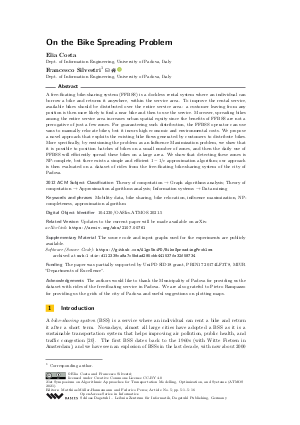OASIcs.ATMOS.2021.5.pdf
- Filesize: 4.14 MB
- 16 pages

 Creative Commons Attribution 4.0 International license
Creative Commons Attribution 4.0 International license

A free-floating bike-sharing system (FFBSS) is a dockless rental system where an individual can borrow a bike and returns it anywhere, within the service area. To improve the rental service, available bikes should be distributed over the entire service area: a customer leaving from any position is then more likely to find a near bike and then to use the service. Moreover, spreading bikes among the entire service area increases urban spatial equity since the benefits of FFBSS are not a prerogative of just a few zones. For guaranteeing such distribution, the FFBSS operator can use vans to manually relocate bikes, but it incurs high economic and environmental costs. We propose a novel approach that exploits the existing bike flows generated by customers to distribute bikes. More specifically, by envisioning the problem as an Influence Maximization problem, we show that it is possible to position batches of bikes on a small number of zones, and then the daily use of FFBSS will efficiently spread these bikes on a large area. We show that detecting these zones is NP-complete, but there exists a simple and efficient 1-1/e approximation algorithm; our approach is then evaluated on a dataset of rides from the free-floating bike-sharing system of the city of Padova.


















Feedback for Dagstuhl Publishing